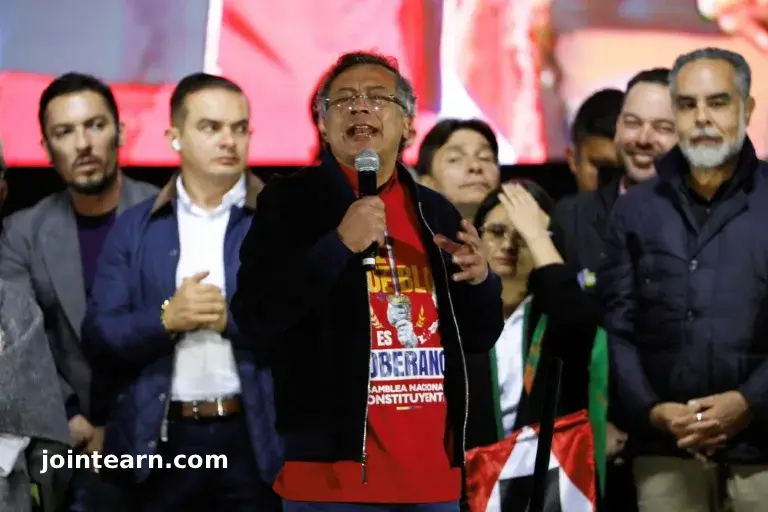
Colombian President Gustavo Petro encountered unexpected diplomatic turbulence this week when his presidential aircraft was denied refueling in Madrid, Spain — a direct consequence of U.S. sanctions imposed against him. The incident underscores the widening geopolitical rift between Petro’s leftist government and Washington as the Colombian leader continues his high-profile tour of the Middle East.
According to Colombia’s Interior Minister Armando Benedetti, the presidential plane made a scheduled stop at Madrid’s Barajas Airport to refuel en route to Riyadh, Saudi Arabia. However, Spanish officials initially refused service, citing concerns related to U.S. Treasury Department sanctions administered by the Office of Foreign Assets Control (OFAC). These restrictions effectively prohibit U.S.-linked companies from conducting business with individuals on the sanctions list.
After tense negotiations between Colombian and Spanish authorities, the aircraft was eventually allowed to refuel at a nearby Spanish military base. Petro later expressed his gratitude on social media, thanking “the kingdom of Spain” for its cooperation and assistance in helping him continue his diplomatic journey to Riyadh.
Background: U.S. Sanctions on President Gustavo Petro
The refueling standoff stems from a sweeping package of U.S. sanctions introduced by the Treasury Department last week. Washington accused President Petro of enabling Colombia’s drug cartels, allowing cocaine production to surge to record levels, and undermining counter-narcotics operations.
In a statement, U.S. Treasury Secretary Scott Bessent said, “Since President Gustavo Petro came to power, cocaine production in Colombia has exploded to the highest rate in decades, flooding the United States and poisoning Americans.”
The sanctions — enacted under the Trump administration — froze Petro’s assets in the United States and barred him, his wife Veronica Alcocer, their eldest son Nicolas, and Interior Minister Benedetti from entering the country. The measures also prohibit American firms or companies with U.S. investments from doing business with the sanctioned individuals.
Spain Caught in Diplomatic Crossfire
Spain’s Barajas Airport, one of Europe’s busiest international hubs, became an unexpected flashpoint in the ongoing U.S.-Colombia tension. Benedetti explained that the aviation service companies at the airport, many of which are U.S.-affiliated, were reluctant to provide refueling or logistical support for Petro’s aircraft.
“The companies that sell fuel or provide cleaning services or the boarding stairs (at airports) are almost always American,” Benedetti said. “They refused to provide the refueling service because of the OFAC sanctions.”
The diplomatic standoff highlighted how deeply U.S. sanctions can influence global logistics and air travel — even for a sitting head of state.
Petro’s Middle East Tour Continues Despite Setback
Despite the controversy, Petro continued his three-nation tour of the Middle East, which includes visits to Saudi Arabia, Qatar, and Egypt. The Colombian president aims to strengthen energy cooperation, investment partnerships, and climate change initiatives with Gulf nations.
Writing on X (formerly Twitter), Petro expressed appreciation for Spain’s eventual assistance and reaffirmed his government’s commitment to pursuing “independent foreign policy free from external interference.”
U.S.-Colombia Relations Reach New Low
Relations between Washington and Bogotá have deteriorated sharply in recent months. The Trump administration has repeatedly criticized Petro’s handling of narcotics enforcement and alleged human rights violations. The U.S. State Department also revoked Petro’s visa last month after he participated in a protest in New York, where he called on U.S. soldiers to disobey presidential orders — a move Washington described as “reckless and incendiary.”
Petro, a former left-wing guerrilla, has dismissed the U.S. allegations as politically motivated. He maintains that the drug trade crisis is fueled by demand from wealthy Western nations rather than Colombian policy failures.
“The United States cannot continue blaming Colombia for a problem that is fundamentally theirs,” Petro said in an interview earlier this month. He also accused Washington of violating international law through airstrikes on suspected drug boats in South American waters, which he claimed resulted in civilian casualties — an accusation the White House has denied.
Broader Implications for Latin America
Analysts warn that Petro’s growing isolation from Washington could push Colombia closer to non-Western allies such as China, Russia, and Middle Eastern nations. His administration has already signaled interest in joining the BRICS economic bloc and diversifying trade away from U.S.-centric markets.
The refueling debacle in Madrid, though temporary, serves as a symbolic reminder of how international sanctions can disrupt not only financial systems but also the movement and diplomacy of national leaders.
As Petro continues his tour of the Middle East, questions remain about the future of Colombia’s strategic relationship with the United States — a partnership once hailed as a cornerstone of regional stability but now strained by ideological and political divides.


Leave a Reply